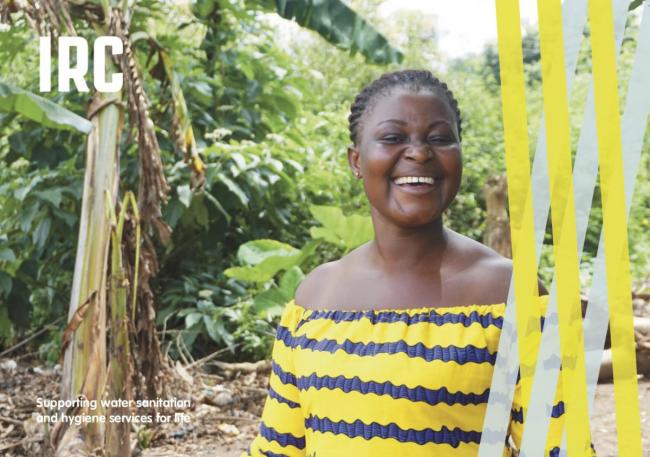With the year drawing rapidly to a close (already?!), time to reflect briefly on what has kept IRC busy this year.
Published on: 19/12/2018

What I’m proudest of is the development of WASH master plans in our partner districts in Ghana, Burkina Faso and Uganda. Focused on universal access to WASH by 2030, the development of the plans is led by local government and supported by IRC and broad networks of partners working in the district. Their development and launch has been an important step in the process of making the Sustainable Development Goals (SDGs) real and tangible. They have often been hailed as a model for the country. For IRC they represent an important first step – a statement of intent – in a theory of change that sees collective action and government leadership as the way to work out how to achieve the SDGs.
Now, with the master plans developed, and clear local government leadership for delivering universal access by 2030, the focus for 2019 and beyond shifts to implementation. This will be challenging and won’t be done in a year. The master plans expose serious challenges, not all of which can be overcome at the district level. Challenges around weak systems, lack of finance, lack of appropriate service delivery models, lack of data. This said, the heart of our theory of change is that strong political leadership, committed partners for collective action and a clear vision are the prerequisites for progress. With all of these in place, we’re confident and excited about what comes next.
Finance is one (arguably the) critical building block in the WASH system, and 2018 seemed to be the year of blended finance, at least as far as talking. Whether, in the end, private finance is going to come riding to the rescue of the WASH sector is still up for debate – and frankly and personally I remain skeptical. But it is undoubtedly a very good thing that the whole issue of finance for the sector is being so actively addressed. IRC’s message throughout the year has been that whatever finance can be attracted to the sector it will come following public money and political commitment. The sector has to be made investable, and this only happens when national and local government get serious about making it so, funding the key institutions that provide an enabling environment. This calls for the sort of strong and unambiguous political support that India has shown through its Swachh Bharat mission. In 2019 we’ll be redoubling our efforts to get other countries to put WASH at the top of the agenda, both as IRC and collectively through Sanitation and Water for All.
Alongside strong national leadership, providing services to all requires strong and united service users. To this end we supported a major publication in 2018: the Global Review of National Accountability Mechanisms for SDG6. This document, developed by a broad group of civil society organisations, mapped the space for civil society to hold government to account for delivering WASH services. Access to water and sanitation are fundamental human rights, and ensuring their delivery is a duty of government. Strong civil society voice to demand this right is an essential part of a healthy WASH system – and one that IRC remains committed to supporting.
2018 (precisely, the 19th of December 2018) is IRC’s 50th birthday! We’ve been celebrating in a low key way all year, and will round this off with our All Systems Go! conference on WASH systems in The Hague in March 2019. Interest in WASH systems has continued to grow throughout the year and this symposium will offer an opportunity to bring multiple strands of interest and experience together, to take stock of where we are now and what happens next. For me, the most important step is simply the initial recognition that sustainable WASH services require a strong WASH system to deliver them – a system made up of actors and factors, hardware and software, people and processes. If there’s one overriding lesson of the failures of the past decades it is that trying to address WASH in a piecemeal fashion doesn’t work. Universal access demands that all the WASH building blocks, and all the connections between them, are working (at least well enough) all of the time.
Working out what that looks like in practice is what we’re supporting in our partner district, and through the coalitions we are part of and support: Sanitation and Water for All; Agenda for Change; the Millennium Water Alliance and others. We believe passionately that if the first step to building strong WASH systems is understanding that we need strong WASH systems, the second is recognizing our own place in the system – and that of others. That’s why we’re so committed to collective action, to coalitions, networks and partnerships. Because its only by working together, as governments, civil society, users, academia, private sector, service providers that we will achieve what remain an ambitious set of goals.
So here’s wishing all of you a happy holiday period and a successful and collaborative 2019. And hoping to welcome many of you to The Hague in March.
At IRC we have strong opinions and we value honest and frank discussion, so you won't be surprised to hear that not all the opinions on this site represent our official policy.